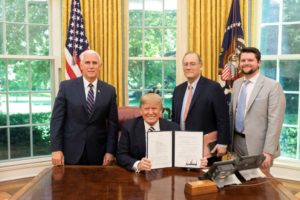
The United States National Space Council was re-established by President Donald J. Trump in 2017 after ceasing operations in 1993. The Council works to develop a strategy for national space activities and also to foster co-operation with other countries and space agencies in order to advance the U.S. space agenda and to share information. In this fascinating interview, SpaceWatch Global’s Torsten Kriening speaks with Dr. Scott Pace, Executive Secretary of the National Space Council, about going back to the Moon, regulatory reform, the prospect of counterspace capabilities, and international cooperation.
This is Part II of the interview with Dr. Scott Pace. Part I was published on Sunday, 2 December 2018, and can be found here.
As you look out at the commercial space sector, who do you see as perhaps the biggest competitor to U.S. space commerce today?
Not so much a competitor but a potential problem is China. China is becoming increasingly active in commercial space activities and at one level that’s a perfectly normal thing to occur. However, Chinese behaviour in other industrial sectors has had a distorting effect on markets. It has affected patterns of innovation and patterns of ownership. We’ve had problems with theft of intellectual property (IP), with domestic Chinese regulations that make it difficult to operate in China without your company being put at a disadvantage. So, China’s behaviour in international commercial markets and other areas raises concerns about how they will behave in the space environment – particularly since space technology tends to be dual use technology. China has a policy of civil-military integration and frankly, something that we might benefit from ourselves. That said, Chinese civil-military integration is quite pervasive. Therefore, if you are looking to do commercial partnerships in China you are really partnering with the People’s Liberation Army and if that’s ok, fine. But if it’s not okay people need to be aware of it. There’s Chinese money that’s flowing into many investments and our experience in other sectors tells us that that money can often have a distortive effect in terms of the competitiveness of those companies or in terms of loss of IP or of being placed at a disadvantage in comparison with favoured Chinese providers. I think China is a concern for us, not a major competitor.
Congress is obviously concerned with certain foreign investments and acquisitions in the U.S. to include space and satellite interests. How does the U.S. balance strategic and national security concerns against protectionist impulses that might prevent legitimate foreign investments and acquisitions?
I think you must have continuous multilateral discussions with other countries and partners, just as we do with export controls where we stress that these are enforced for national security purposes and are not being implemented to advantage national champions at home. We do these things because we have clear national security concerns.
I think that, in the area of investments, it’s important to talk with our partners and traditional friends and allies to be able to highlight the security threats that we see. If we don’t get them to agree with us, then our ability to enforce investment restrictions or to find bad actors is going to be hurt. This is not something the U.S. can do by itself. We can lead on it and work with other countries on it but we need other countries to recognise that investments by certain entities in certain areas pose security risks and we agree and will cooperate. As we look at space-related investment flow worldwide, the U.S. must take a multinational approach.
The U.S. has expressed concerns about Russian and Chinese counterspace capabilities since the Obama Administration and the Trump administration seems to have stepped up that criticism, in international fora. Perhaps the biggest change seems to be a U.S. willingness to compete with China and Russia rather than shape and change their policies. Is that a fair assessment in your view?
It’s a good observation. I would say that what’s happened with the Trump administration has been a recognition of space as a warfighting domain. That policy recognition, which is a change from the Obama Administration, is something that professionals always talked about in terms of professional military doctrine but not in terms of national policy. If you look at our national security strategy and our national strategy for space, it’s very clear we are focusing on things like deterrence and how we make systems more resilient and how we can shape a more conducive international environment.
Treating the space domain as a warfighting domain is not very different from other domains such as air, sea, and land. We are looking at how we respond to Chinese and Russian initiatives as well as Iran and North Korea – which are smaller potential threats. There is also recognition of our reliance on space systems, not just for military purposes, but for our economy. Threats to space systems – providing communications, navigation, remote sensing – are also threats to our national infrastructure and not just our military forces. For developing countries, it can be a threat to their existence if space infrastructure are lost. Many countries are interested in preventing war in space, and rightly so, because they fear they will be harmed in such a conflict. The United States does not want war in space either, just as we do not want nuclear war. What we need to do is to work really hard, every day, to deter the risk of war; to makes our systems more resilient in the event of an attack, to have friends and allies to respond in the event of an attack and to be fully frank and transparent. The main thing we have done is simply to be truthful about the situation we are in.

What does the desirable end state look like?
I think the desirable end state is where the space environment is stable and secure, where no one fears that anyone has an incentive for a strike against space assets and where space assets are considered resilient enough that they are not tempting targets. There will continue to be conflicts, but what we would like is for space to never be a source or an incentive for conflict on Earth. You don’t want people to think that an attack in space is an easy way to shape conflict on the ground. We need to promote a feeling that space is not the weak link or a source of instability and that can be achieved in a variety of ways in terms of moderating actions of our adversaries by strengthening the offensive and defensive characteristics to make them realise that no good will come of their actions and that they won’t like the response their actions result in. So fundamentally, the end state is a psychological understanding, as we have achieved in nuclear conflict where no one believes that a nuclear war is worth fighting. But you have to work hard every day to make sure that people continue to believe that.
What role is there for international cooperation not just in civil space but also military and commercial space?
I think what’s important to recognise is that space is an area beyond traditional ideas of sovereignty. It’s not even like the oceans where there are territorial areas. It’s also unlike areas such an Antarctica, the high seas, or cyberspace. The U.S. does not act unilaterally in space and we have the responsibility to try to attract and shape the views of other countries so we all treat the space environment so that it is, in John F. Kennedy’s words: “a peaceful ocean rather than a new terrifying theatre of war.” In order for that to occur, other sovereign states have to voluntarily decide that they wish to create stable norms of behaviour and that countries that behave outside of those norms are the ones who are working against international stability and peace. So space projects, whether they are scientific exploration or security projects, are all important and open to like-minded countries. We need their support and their voluntary behavior, because while we cannot impose outcomes, we can lead the creation of order in this environment.
Outside of NASA’s tremendous achievements in terms of international cooperation what other initiatives is the U.S. pursuing in terms of military and commercial space cooperation?
You can see many companies cooperating in the commercial world. In remote sensing and geospatial industries, you can see the global work that GPS companies already do. You look at the foreign investment flowing into human spaceflight ventures such as Virgin Galactic. On the military side, space cooperation has been producing better information about the space environment. For example, we have signed Space Situational Awareness sharing agreements with Japan and many other countries. With Japan in particular, we have been doing more work on maritime domain awareness which is using space systems as well as ground systems to produce more awareness of what’s in the maritime environment. This includes data sharing and data analysis and it’s really about using space as a platform of information sharing to include other countries such as India, Australia, Vietnam, Malaysia, Philippines and so forth. It’s part of voluntary cooperation among sovereign states in order to produce a more stable environment. This cooperation doesn’t necessary result in a big, dramatic project that sits on a launch pad, but they represent the value of cooperation among thousands and thousands of people every day around the world.
Dr. Scott Pace is the Executive Secretary for the National Space Council. The Council is chaired by Vice President Michael R. Pence. He began this position in August 2017.
Dr. Pace was formerly the Director of the Space Policy Institute and a Professor of the Practice of International Affairs at George Washington University’s Elliott School of International Affairs from 2008-2017. From 2005-2008, he served as the Associate Administrator for Program Analysis and Evaluation at NASA. Prior to NASA, Dr. Pace was the Assistant Director for Space and Aeronautics in the White House Office of Science and Technology Policy (OSTP).
Dr. Scott Pace was also a member of the SpaceWatch.Global Advisory Board prior to his appointment to the U.S. National Space Council.
 SpaceWatch.Global An independent perspective on space
SpaceWatch.Global An independent perspective on space




